Locked behind bars, nearly 1,000 screaming macaques are working themselves into a feverish frenzy. Gangs of former street macaques have spotted their upcoming party and are fighting for top spot.
A moment later the guards enter and the screeching animals jump on them. Like swarming rats they clamber over each other to grab their loot; within seconds the crates of banana, jelly and Yakult are empty.
Until recently, these chaotic scenes were not playing out behind steel mesh, but in the center of Lopburi, a Thai city about 100 miles north of Bangkok, where marauding macaques ruled the streets.
Dubbed “Monkey City,” the animals are central to Lopburi’s identity and a major draw for curious tourists. As their numbers grew, long-suffering locals grew tired of them.
Homes and people were increasingly attacked; the bleak, gray shopping street was filled with shuttered shops after businesses relocated to avoid the carnage. The city’s mayor described Lopburi as almost a “deserted city.”
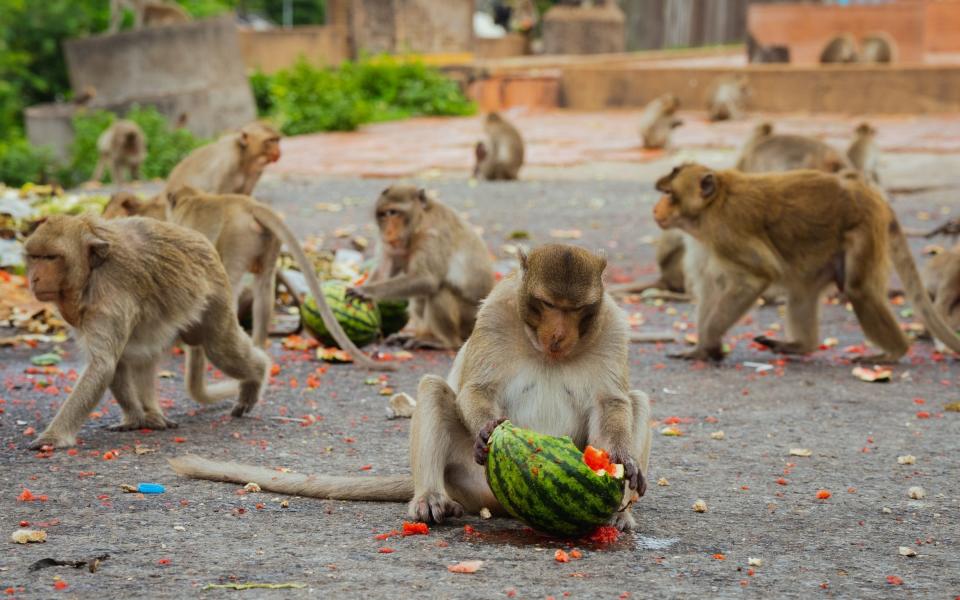
In March, the final straw came when a man was pushed off his moving motorcycle by hungry macaques searching for food, while a woman was knocked over and dislocated her knee.
“The conflict between humans and monkeys escalated, we had to take action,” Suttipong Kaemtubtim, director of wildlife conservation at the Department of National Parks, Wildlife and Plant Conservation (DNP), told The Telegraph.
“The core problem was the overpopulation of monkeys, but they were getting into houses, stealing from shops, cars, from people’s hands. They were causing accidents – there was an increase in motorcycle accidents involving monkeys. So we had to intervene to get the situation under control.”
In late April, the government announced a three-step peace plan to capture, sterilize and rehome most (but not all) of the macaques. So far, a police “monkey unit” has captured nearly 1,200, using tropical fruit as bait to lure the monkeys into wire mesh relocation crates.
While the ultimate goal is to release the macaques into a 3,000-hectare sanctuary, for now they are being moved to large cages scattered around the city. This includes the “Monkey Garden” on the southwestern outskirts of Lopburi, where three fully enclosed cages each hold about 300 of the excited monkeys, who go completely berserk during feedings.
Capturing and transporting the macaques was no easy task, Mr Suttipong said, especially as the many street gangs in Lopburi had to be separated.
“There is a class system in ape society. There will be a larger male ape at the top of each gang who, with his entourage, has the best status. And then younger, stronger apes can fight to move up,” he explained.
“We have to trap the troops within their gangs and put them each in a separate cage to prevent them from fighting each other for food and space… they are all very territorial.”
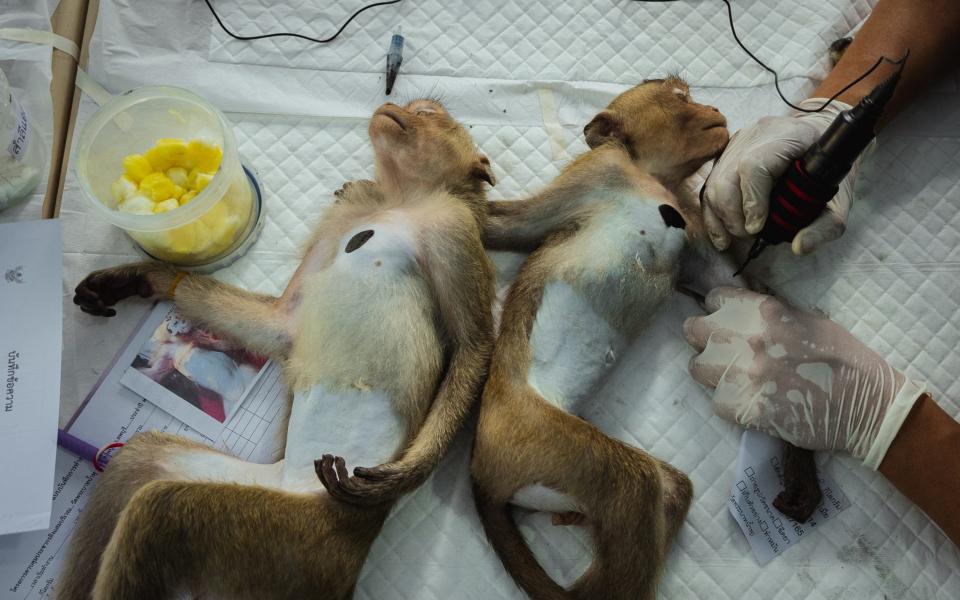

Across town, a Buddhist temple has built an open-air “Monkey House” enclosure (complete with a viewing platform for visitors) to house another 300 people. When the Telegraph visited the newly completed enclosure, the hardiest macaques were desperately trying to gain freedom — attempting, with limited success, to scale the corrugated iron walls.
But inside a makeshift clinic on location, with cheesy Thai pop tunes blaring on the radio, a more surreal scene unfolded. Dozens of sedated, shaved macaques were neatly lined up on countertops, their arms tattooed with fingers indicating where and when they had been castrated.
“We sterilize them to help with the overcrowding problem, but we also vaccinate them against diseases like rabies that can jump to humans,” said Sunita Wingwan, a DNP veterinarian, as her colleagues carried two anesthetized newcomers across the room by the scruff of their necks.
“I cover four provinces, but Lopburi definitely has the biggest problem with macaques. In fact, it has the worst problem in Thailand,” she added.
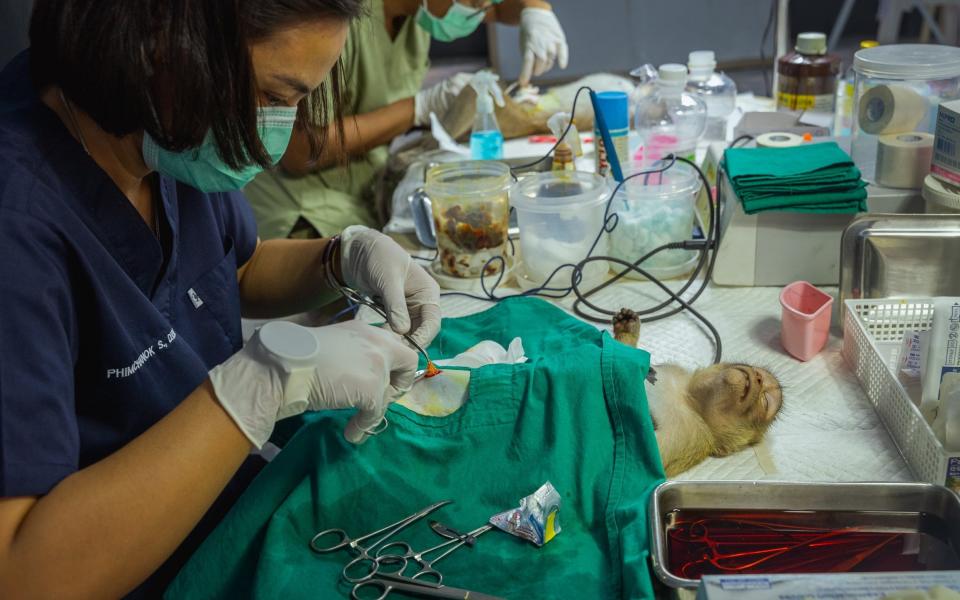

Sterilizing the rapidly breeding macaques is nothing new—Thai authorities have castrated or sprayed about 2,600 since 2014 (in a Buddhist society, culling the animals is out of the question). But locals lament that the efforts have had limited impact.
Somporn Iampin, who runs a small shop selling duck soup overlooking an ancient Khmer temple known for its “monkey buffets” every November, says the population has grown out of control over the past six years.
On the counter of the shop sits Mrs. Iampin’s deterrent: a wooden slingshot and two dozen clay balls. Monkeys in this area have yet to be rounded up, and others on the street still have stuffed tiger heads or electric wires to scare them away. Some serve customers behind metal grills.
“They are constantly causing problems, coming into the store, climbing on tables, taking food,” said Mrs. Iampin, complaining that the new initiative was long overdue. “We don’t want to hurt them, but there are too many of them. They are constantly causing problems.”
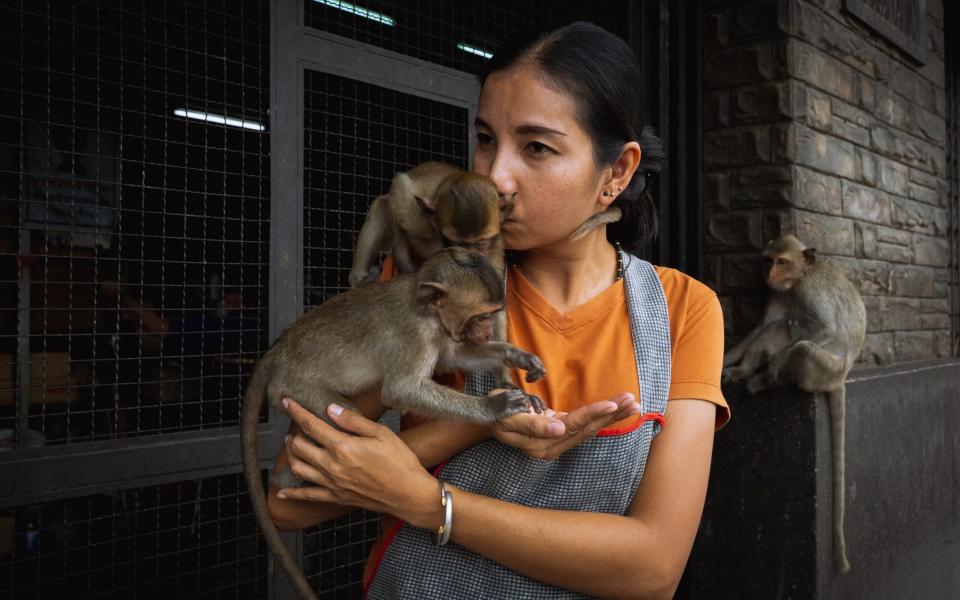

Supaporn Tantiwong agreed that the government needed to intervene, saying that clearing other areas had already reduced the density of monkeys roaming outside her shop. But the 39-year-old, who runs her family’s auto parts business, isn’t against the macaques, in fact she lets babies crawl all over her.
“I always feed the monkeys. I think some people are not aware that they are only aggressive when they are hungry. There is no natural food source for them here, so they have to look for human food,” said Ms Tantiwong.
“I think we needed a compromise to control the population, the market and many shops in this area had to close. We just need to make sure that the cages where they live have good conditions and enough food,” she added. “I worry that the government doesn’t have enough money to take good care of them.”
Earlier this year, Lopburi Mayor Chamroen Salacheep said he planned to “do a major clean-up in the city and paint all the buildings” once the monkey operation was completed.
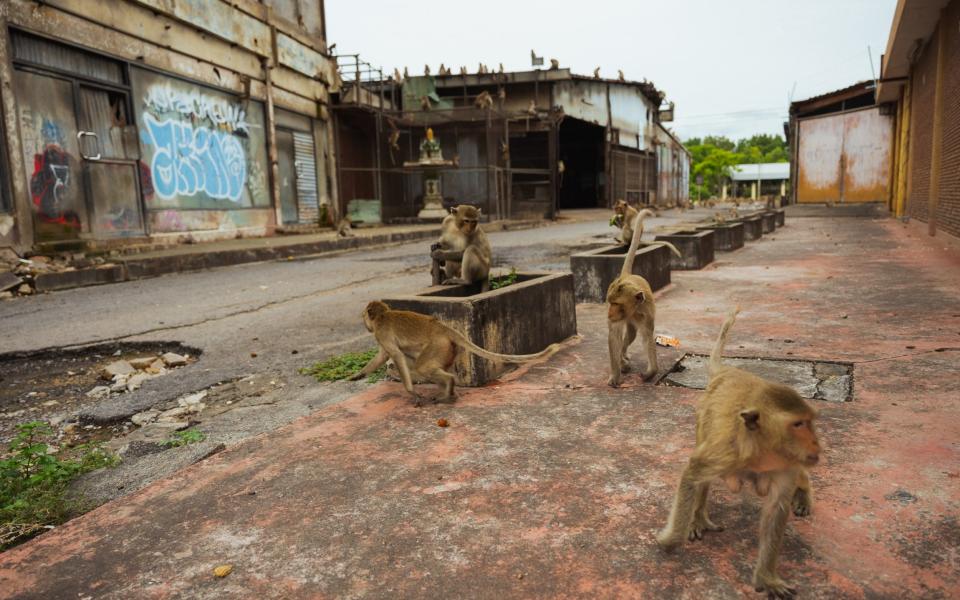

Mrs Tantiwong only hopes that Lopburi will not lose heart in the process.
“There is a famous story in this area, linked to a monkey character that protects the king in the legends,” she said. “At the end of the war, the king’s arrow fell on this city and it became the ‘Monkey City.’ That is our history, that is why people visit.
“We need to keep the population under control, but I’m glad they’re not going to take all the monkeys away. I’d miss them if they were gone.”